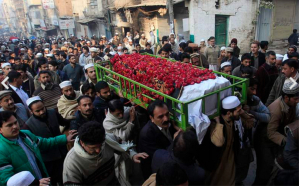
In a move that is called a reaction to the killing of 149 people at a Pakistani school last week, the country has reinstated its death penalty and is actively executing convicts again, including a proposed 500 more in coming weeks.
When nine gunman stormed a school in Peshwar on December 16, demanding sexual acts and murdering children in the worst massacres in Pakistan's history, the Pakistani people rose up to demand retaliation from the government. The Pakistani army quickly answered those pleas, facilitating air and ground attacks on Taliban forces within the border of Afghanistan and Pakistan.
From those attacks, a reported 77 Taliban terrorists were killed, but it was the reinstatement of the death penalty following the attacks that will see the biggest retaliation as the government says that it plans to execute around 500 militants who are currently being held in the country.
"Interior ministry has finalised the cases of 500 convicts who have exhausted all the appeals, their mercy petitions have been turned down by the president and their executions will take place in coming weeks," a senior government official said on condition of anonymity.
Since Friday, six militants have already been hanged. Five of those were convicted of a failed assassination attempt on former military ruler Pervez Musharraf and the sixth was involved in a 2009 attack on Pakistani army headquarters.
The death penalty was officially halted in 2008 for civilians, but it was technically still possible for judges in the country to pass down death sentences by hanging. Despite this, only one person had been hanged since the ban: a soldier convicted of martial law and executed in 2012.
Prime Minister Mawaz Sharif said that the death penalty reinstatement is meant for terror-related convictions and he has ordered the attorney general's office to "actively pursue" capital cases that are currently making their way through the court system.
Not surprisingly, this decision has met with resistance from Pakistani human rights groups, as well as the United Nations who calls for the Pakistani government to reconsider. Human Rights Watch says that this new death penalty reinstatement "tramples human rights" and needs to be stopped immediately.
"Pakistan's government has chosen to indulge in vengeful blood-lust instead of finding and prosecuting those responsible for the horrific Peshawar attack," said Phelim Kine, deputy Asia director of the human rights organization. "The government's death penalty spree is a craven politicized reaction to the Peshawar killings that will do nothing to bring the attackers to justice."
"A joint report issued earlier in December by the nongovernmental human rights organizations Justice Project Pakistan and Reprieve concluded that the high number of people on death row for terrorism-related convictions reflects an "overuse" of anti-terrorism laws by Pakistan's security forces and judiciary," a report at Human Rights Watch said on Friday.
"Misusing military courts, a resumption of executions, and denying media access to conflict areas is a recipe for renewed human rights violations rather than a rights-respecting response to militant atrocities," Kine said. "The Pakistan government should respect the memory of the Peshawar massacre victims by upholding the rule of law for which the attackers showed such contempt."







